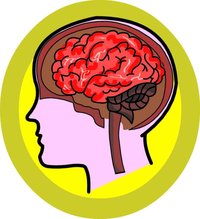Hippocampus
|
|
The hippocampus is a part of the brain located inside the temporal lobe (humans have two hippocampi, one in each side of the brain). It forms a part of the limbic system and plays a part in memory and navigation. The name derives from its curved shape, which supposedly resembles that of a seahorse (Greek: hippocampus).
In Alzheimer's disease, the hippocampus becomes one of the first regions of the brain to suffer attack; memory problems and disorientation appear amongst the first symptoms. Damage to the hippocampus can also result from oxygen starvation (anoxia) and encephalitis.
In the anatomy of animals, the hippocampus is among the phylogenetically oldest parts of the brain. The hippocampal emergence from the archipallium is most pronounced in primates and Cetacean sea mammals. Nonetheless, in primates, the hippocampus occupies less of the telencephalon in proportion to cerebral cortex among the youngest species, especially humans. The significant development of hippocampal volume in primates correlates more with overall increase of brain mass than with neocortical development.
| Contents |
Role in general memory
Psychologists and neuroscientists dispute the precise role of the hippocampus, but generally agree that it has an essential role in the formation of new memories about personally experienced events (episodic or autobiographical memory). Some researchers prefer to consider the hippocampus as part of a larger medial temporal lobe memory system responsible for general declarative memory (memories which can be explicitly verbalized—these would include, for example, memory for facts in addition to episodic memory).
Some evidence exists that, although these forms of memory often last a lifetime, the hippocampus ceases to play a crucial role in the retention of the memory after a period of consolidation. Damage to the hippocampus usually results in profound difficulties in forming new memories (anterograde amnesia), and normally also affects access to memories prior to the damage (retrograde amnesia). Although the retrograde effect normally extends some years prior to the brain damage, in some cases older memories remain - this sparing of older memories leads to the idea that consolidation over time involves the transfer of memories out of the hippocampus to other parts of the brain. However, experimentation has difficulties in testing the sparing of older memories, and in some cases of retrograde amnesia the sparing apparently affects memories formed decades before the damage to the hippocampus occurred, so its role in maintaining these older memories remains controversial.
Damage to the hippocampus does not affect some aspects of memory such as the ability to learn new skills (playing a musical instrument, for example), suggesting that such abilities depend on a different type of memory (procedural memory) and different brain regions. And there is evidence (e.g. O'Kane et al 2004 (http://www3.interscience.wiley.com/cgi-bin/abstract/108562086/ABSTRACT)) that patient HM (who had his medial temporal lobes removed bilaterally as a cure for epilepsy) can form new semantic memories.
Role in spatial memory and navigation
Some evidence implicates the hippocampus in storing and processing spatial information. Studies in rats have shown that neurons in the hippocampus have spatial firing fields. These cells are called place cells. Some cells fire when the animal finds itself in a particular location, regardless of direction of travel, while most are at least partially sensitive to head direction and direction of travel. In rats some cells, termed splitter cells, may alter their firing depending on the animal's recent past (retrospective) or expected future (prospective). Different cells fire at different locations, so that by looking at the firing of the cells alone, it becomes possible to tell where the animal is. Place cells have now been seen in humans involved in finding their way around in a virtual reality town. The findings resulted from research with individuals who had electrodes implanted in their brains as a diagnostic part of surgical treatment for serious epilepsy.
The discovery of place cells led to the idea that the hippocampus might act as a cognitive map -- a neural representation of the layout of the environment -- which would permit one to figure out new routes and short cuts between places. Studies with animals have shown that an intact hippocampus is required for simple spatial memory tasks (for instance finding the way back to a hidden goal).
Without a fully functional hippocampus humans may not successfully remember the places they have been to and how to get where they are going. Researchers believe that the hippocampus plays a particularly important role in finding shortcuts and new routes between familiar places. Some people exhibit more skill at this sort of navigation than do others, and brain imaging shows that these individuals have more active hippocampi when navigating.
London's taxi drivers must learn a large number of places -- and know the most direct routes between them (they have to pass a strict test, The Knowledge, before being licensed to drive the famous black cabs). A study at University College London (http://www.pnas.org/cgi/content/full/97/8/4398) showed that part of the hippocampus is larger in taxi drivers than in the general public, and that more experienced drivers have bigger hippocampi. It may be that having a bigger hippocampus helps you to become a cab driver. It also seems that finding shortcuts for a living may make your hippocampus grow.
A study on rats at Indiana University suggested that the sexual dimorphism in the hippocampus morphology is tied to a sexual dimorphism in repeated maze performance. Males seem to be better at contexualizing their whereabouts because they have more hippocampus to work with.
History
The anatomist Giulio Cesare Aranzi (circa 1564) first used the term hippocampus for describing the cerebral organ. This organ was initially connected with the sense of smell, rather than with its known function in memory acquisition. The Russian Vladimir Bekhterev noted the role of the hippocampus in memory around 1900, based on observations of a patient with profound memory disturbances. However for many years, the conventional view of the hippocampus was that, like the rest of the limbic system, it was responsible for emotion.
The importance of the hippocampus in memory was brought to the attention of researchers by patient HM. HM suffered from a number of anterograde and temporally graded retrograde memory impairments following the bilateral removal of various medial-temporal lobe structures (including the hippocampus) to relieve frequent epileptic seizures. Of particular note is that HM was still able to learn, for instance, procedural tasks, and still had an above average IQ, demonstrating a striking dissociation of his inability to create new memories, while he remains unimpaired at many other cognitive tasks. The relative size of the hippocampal formation in relation with the total volume of the brain is often conserved in most of the mammalians. Nevertheless, it has been found that these areas are relatively hypotrophic in cetaceans.
Related topics
- Long-term potentiation (LTP)
- Long-term depression (LTD)
- subiculum
- dentate gyrus
- List of regions in the human brain
- Memory consolidation
- Neurogenesis - the hippocampus is one of two brain areas which continues to grow new neurons throughout life
External links
- Artificial Hippocampus (http://www.newscientist.com/news/news.jsp?id=ns99993488)
In Greek mythology, the hippocampus ("horse-like sea monster") was a mythical monster, half horse, half sea-monster. One of them pulled Poseidon's chariot. It looked like a horse with the rear part resembling a fish or dolphin.
In the popular movie Memento, the main character suffers from damage to his hippocampus. Thus he is unable to form new memories.
In biology, hippocampus is a genus of fish, the seahorses, that swim upright with a gripping tail and a horse-like head.
Brain damage due to alcohol has been said to be concentrated within the hippocampus.
Anatomy Clipart and Pictures
- Clip Art (https://classroomclipart.com)
- Anatomy Illustrations (https://classroomclipart.com/clipart/Illustrations/Anatomy.htm)
- Anatomy Clipart (https://classroomclipart.com/clipart/Anatomy.htm)
- Anatomy Animations (http://classroomclipart.com/cgi-bin/kids/imageFolio.cgi?direct=Animations/Anatomy)


